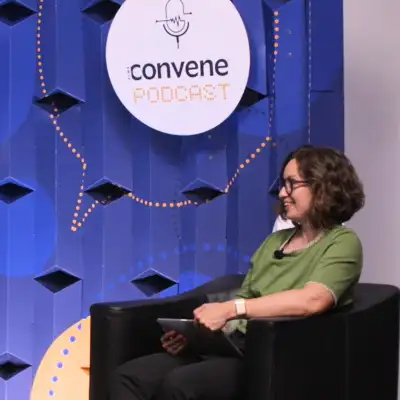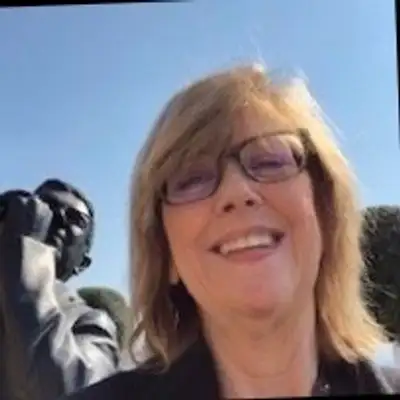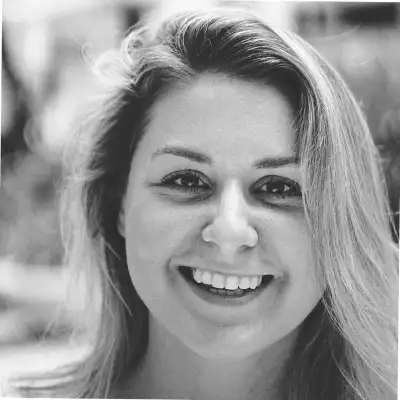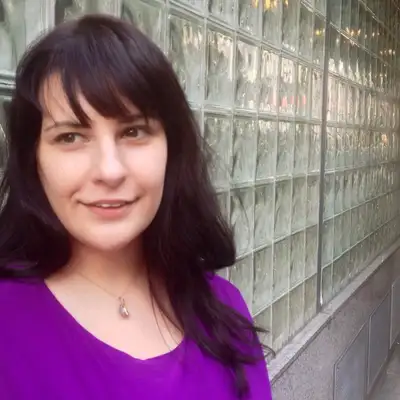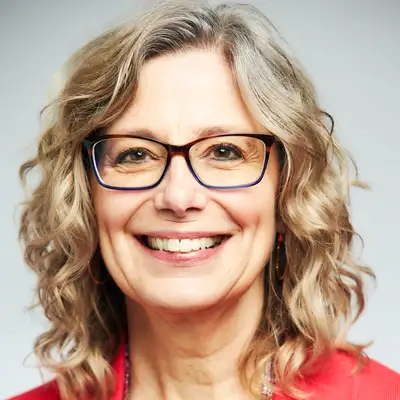Creators and Guests
What is PCMA Convene Podcast?
Since 1986, Convene has been delivering award-winning content that helps event professionals plan and execute innovative and successful events. Join the Convene editors as we dive into the latest topics of interest to — and some flying under the radar of — the business events community.
Convene Talk, ep. 77/Sept 5, 2025
*Note: the transcript is AI generated, excuse typos and inaccuracies
Magdalina Atanassova: This is the Convene podcast. It's time for another Convene talk. Michelle, over to you.
Michelle Russell: Thanks Maggie.
I picked a Nature article which the headline of course would I think make anybody sit up and pay attention.
Scientific Bedlam at the world's weirdest and Wildest Research Conference.
And this is about Woodstock Bio two plus night science.
And it was somebody who a freelance writer for Nature attended.
So it was a first person story about her experience at this event which took place around Prague. So it was in and around Prague in mid June and it was like, you know, completely unconventional.
It was something that did not have felt a little wild and a little out there.
Held in various locations on the third day at a wooded campsite,
attend. And so here's an example of what they did that was different. Like some of the papers were delivered in rhyme.
Attendees were given five minute slots to speak in and they summarized their research on a single slide.
And they were called to the podium in rand order.
Each speaker was hailed with a self chosen walk up song, often accompanied by impromptu dancing and sounds like fun.
These are all scientists, so I imagine they appreciated a very different approach to research.
It just felt a little forced to me and I kind of got that sense about the writer as well.
So I had the opportunity to speak with a creative director at IDEO this week and I shared this article with him.
He hadn't read the article,
but what he said to me kind of resonated, which is willful weirdness is as bad as boring in his opinion.
So if you're just doing something to just like be different without completely understanding your audience's needs or what the outcome will be.
He feels like what you really need to do is follow a design principle which he called Maya, which is pretty old, which means most advanced yet acceptable.
So do things that people are most comfortable when you do something that's a little, maybe a little innovative,
but doesn't take them entirely out of their comfort zone.
So I'm interested in hearing what the rest of you thought about this,
this festival that took place recently.
Barbara Palmer: You know, I was just scanning the Nature article to see if there was any report on the outcomes. Like I feel like before we say like, oh, this didn't work or this is not a great idea, or this is forced,
I would love to know not just what the journalist thought, but what were the actual outcomes of it, because I loved it. What it looked like to me is, you know, how kids and their parents and grandparents go to these fantastic science museums where,
you know, they get to just pick and choose. And it just. To me, that felt like a science museum.
And I thought that it hit on so many of the things that just in writing the meetings in your brain column for a while were things that are like evidence based, things that open up connection and creativity and,
you know, create safety and engagement is like being in nature,
being a little off the beaten path. You're not doing the same thing that you do all the time.
Fun.
And I think Kate might have something to say about this. Having just written about work is fun. Like fun is an emotion. And it's like.
Like you remember the things that are fun.
I think everybody can look back and go, oh, yeah, that was a really fun professor.
And I remember this from his or her class.
So I thought it was great.
I don't think every science conference should be this way, but to just get people there that. And they had a narrow channel that they were working in. I can't remember the different disciplines,
but there were, you know, people that were working on the same problems.
And I just thought it was a very.
I thought it was great.
I think that that would make you just,
you know,
just the way that you can sit next to somebody and not that you don't know and not look at them for 45 minutes in a traditional conference. I think it would take two seconds of somebody hanging from a bar that you would just be looking at your neighbor and laughing.
So anyway, I thought it sounded like a blast and that it sounded like scientists are like that they play.
Sounded like play for scientists. So, Jen, I'd love to hear what you think.
Jennifer N. Dienst: Thanks, Barbara. I agree with you. Some of it sounded really cool.
I think it left me with some questions. So I'm curious to know if some of these ideas that they came up with,
was this a result of them kind of like surveying their. Their audience and asking them, like, what are you looking for? What you know, besides obviously knowledge sharing and presenting,
like, what kind of activities interest you? Because there's a lot of outdoorsy elements to it. There's like the marathon, the trail race, the improvised Barkley marathon at the end of the story.
So, you know, I think there's like a lot of like, very specific, interesting things that made me.
Maybe they came up with these ideas based on feedback from their own attendees. I kind of wish the journalists went into that a little bit more, and I also wish the journalists also talked to a few more people who participated.
I noticed a couple quotes, but I think I would have loved to know how it was received. And what the feedback was because, yeah, I agree with you, Michelle. If it's gimmicky, for gimmicky sake, it's annoying,
you know, because you're, you're sitting there trying to learn about something that's rather serious and in depth.
And if there's a whole bunch of gimmicky stuff going on, kind of preventing that, like, that's not really fun for anyone.
But yeah, I think some of it sounded pretty interesting and cool and I imagine it was a departure from a typical conference,
actually.
Kate Mulcrone: Yeah, I want to agree with you, Jen,
in terms of the feedback from attendees. So when I finished reading the story, I went back through it again.
And you realize in all of the quotes from attendees,
the scientists are talking about the networking opportunities, but not any results of a connection they made that's going to lead to future collaboration.
And so this leads me to feel like it's kind of a stunt and fun to be quirky rather than like generative outside of the box.
And then the other thing is, Barbara, you talked about hanging from a bar and reciting the names of organisms in Latin.
Between that and then they mentioned a change your mind debate. Hut I really can't say which of those two experience sounds worse to me.
Like, I could think about it all day,
but then it just made me really think between like the festival design and a lot of these sort of like athletic, outdoorsy,
coded activities.
This, this is designed for a really specific sort of person.
It's kind of male coded.
But like the scientific community unfortunately is already sort of stereotypically, overwhelmingly male coded.
And I saw pictures of women in the story,
but I still kind of wonder how comfortable they felt.
And then the final thing I'll say is they talked about the fake wedding at,
at the meeting.
Did anyone else, when they were reading that, immediately think about the movie Midsommar?
Like, all I could picture when I read this was those two old people in the chairs in Midsommar.
Barbara, over to you.
Barbara Palmer: Okay, so I thought about that too. Just because we've written about neurodivergence and I didn't see that addressed in the story.
And I did get the impression that you could pick and choose and that they also had poster presentations. Like it wasn't like the only option was this trail run or to hang from a bar.
It seemed to me like there was a lot of choice.
And just also about the networking,
the fact that they're mentioning networking is good.
Like, I feel like that meant to me, it meant that it broke down some of Those barriers to getting to know people.
And I mean, I could be wrong about that.
What it reminded me of is C2 Montreal,
where if you want, you can hang from the ceiling on a chair,
you can, like,
make lasagna.
You can float down the river and talk to people that you've signed up to talk with before.
You can go to a lounge that's loud. You can. You know,
there's just. It's just a way to kind of shake you out of your traditional ways of seeing things. And I just think it's a great choice and a great experiment.
And I would love to see, as we've talked about, like,
how do people rank that? And did they.
Did they find the researcher there that was working on the same problem that they made a connection with and continued to collaborate with?
So, I don't know, you can tell that I'm a fan just because I like that kind of stuff. That's different.
And that gives you choice.
Michelle Russell: If people had choice, definitely. I think the first thing I thought of was an experience I had on a.
This was a fam trip many years ago where part of the program was a walk outdoors, which was lovely.
Everybody enjoyed that. And then we're immediately taken to a bungee jumping activity over a river.
And that is not for everybody, and it certainly wasn't for me. And I had somebody who was the. They paid this guide to do it. And he said to me, you're gonna regret not doing this and you've gotta get over your fear.
And I just said,
I will not have any regrets, I guarantee. And I'm going to enjoy watching everybody do it.
Not for me. If there was choice put in,
definitely, because there are people who welcome that. But there are other people who,
to your point, Kate,
maybe not so much. Maybe they're not somebody who would hang from a bar and they would look at it like this is just too outside my comfort zone for me to really enjoy it.
So choice, yes.
If that's just part of the program and if you don't participate,
then too bad for you. But this is not the first time they've done this,
so I think they must have already have an audience of people who,
you know, who have come back and maybe it has spread word of mouth. I don't know.
What do you think, Maggie?
Magdalina Atanassova: I had the same reaction like you. Some of the experiences were definitely something I would sign up for.
And also seeing my colleagues barefoot, I would have take some issue with that. I'm sorry, I'm just one of those people that I'M just not enjoying everybody being barefoot around me, especially when I'm there for work, if it's on the beach.
Okay.
So, yeah, there were a few things that I was like, nope.
But, yes, it seems that it draws very specific type of audience. And also the audience was very small, let's say.
Say that as well, because, yeah, it's a Thousands of people that, you know, went to Prague and the woods of. Around Prague just to experience science in a different way.
Michelle Russell: Right.
Magdalina Atanassova: And yes, definitely,
let's hope we can see the results, because it would be interesting if this drives science forward in a different way. So, you know that the connections were made that otherwise wouldn't be made.
That would be amazing. And I would definitely hope that the author would follow up and actually write on that.
Barbara?
Barbara Palmer: Well, and I'm just thinking, if you're a person that doesn't want to do any of that,
you think it's nonsense.
What if you were just then out in nature,
writing your notes, doing email and going to poster presentations like that sounds pretty great.
I don't know, I just think that you just get to where you all file in, you sit down, somebody stands up, gets introduced,
talks like,
you know, I just think it's. I think it's great that they're trying something new.
Michelle Russell: One of the other things that the creative director at IDEO talked about, which I thought was interesting, is in our last.
You said boring. You were talking about the regular. Just going to a regular conference and doing the same thing over and over again. He did feel like there's a lot of that, especially after the pandemic, a lot of rinse and repeat.
So this is obviously going in the opposite direction.
But what was interesting to me, what he said was in our most recent issue, we talked about how different speakers bureaus and a speaker that you spoke to, Barbara, said it used to be that having a pro and con kind of conversation on the main stage was popular.
People wanted to hear different points of view.
And that has changed. There's been a move away from that and definitely because we are very politically polarized. Right.
What he said to me was, those are the most interesting conversations. And at IDEO,
they move toward that, where people.
It's not as much as being polarized, but that's what's interesting, is the different kinds of viewpoints. He said, you just need to have an environment where people feel safe and respected.
And for that to happen.
So just that what you just said, Barbara,
reminded me it's like there's boring. Rinse and repeat and then there's this, which is the opposite end of the spectrum. And then there are other ways to engage people.
Barbara Palmer: I'm thinking about Jess Pettit, and she's the speaker that I talked to, and she said that when there's a problem with people talking to each other,
that's when she gets called in.
I just think that's a great point,
that people kind of back away from that.
And it takes a lot of skill,
and it just also takes willingness to be uncomfortable.
And I feel like.
Sorry that I keep having to ring the bell for out in the woods, but I would just think that would be a disarming kind of environment.
If you can be disarmed and I think then. And just ready to be a little bit more open,
then I agree. Those are great,
great conversations and necessary.
Oh, here's something really cool.
And I don't have all the details,
but it was a conference. People went into the room and there was a speaker on the stage. And she said,
and they're in a place that supported this. And she said, there's no reason for you guys to sit here and look at me while I say this. I invite you to take these headsets that are on every chair and go walk outside and I'll speak.
And I thought that was super cool.
Magdalina Atanassova: Yeah.
Michelle Russell: Get outside to get a whole different perspective than being in a room.
Barbara Palmer: Yeah.
So I think my.
What I'm going to do right now is I'm going to go to a nature trail,
take a walk, because I clearly,
clearly need to get outside.
So I thought that was a great pick,
and it didn't go where I thought it would go.
I thought everyone would just. I think this is awesome.
Michelle Russell: All right, well, thanks, guys, for playing along.
Barbara Palmer: Okay. And I'll see you guys later.
Magdalina Atanassova: Thank you. Remember to subscribe to the Convene Podcast on your favorite listening platform to stay updated with our latest episodes. For further industry insights from the Convene team, head over to PCMA.org/convene. My name is Maggie. Stay inspired. Keep inspiring. And until next time.
